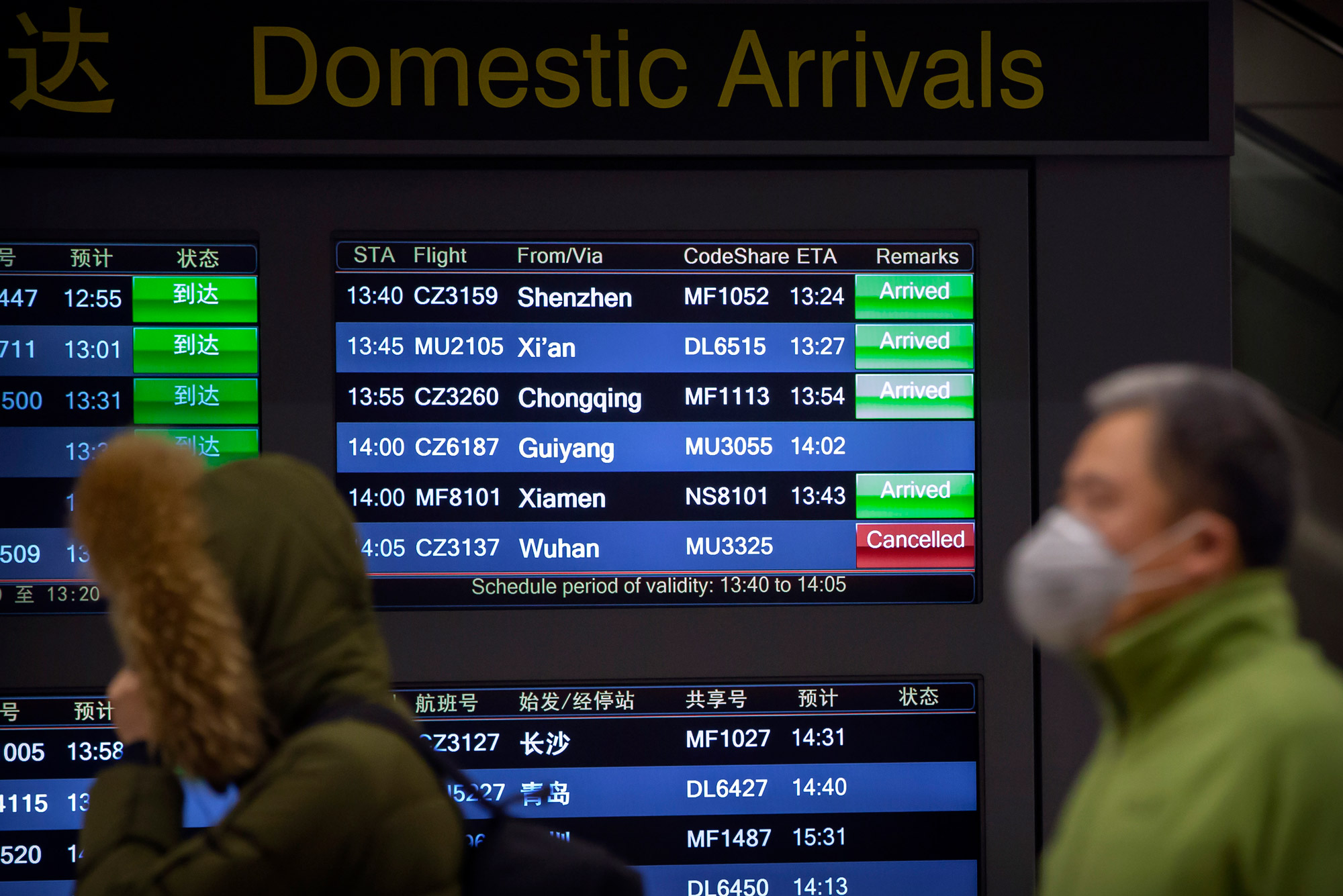BU’s Shanghai Study Abroad Postponed Indefinitely Due to Coronavirus Fears—No Students Have Left Yet for China

A display board of arriving flights showing a canceled flight from Wuhan at Beijing Capital International Airport in Beijing, January 23, 2020. Photo by Mark Schiefelbein/AP
BU Postpones Shanghai Study Abroad Program Amid Coronavirus Fears
University is among numerous schools reacting to the global health emergency.
Boston University has postponed its Shanghai study abroad program until further notice as China races to contain a coronavirus outbreak that has killed 107 globally and infected thousands, including at least six in the US. On Thursday, the World Health Organization declared the outbreak a global health emergency.
The Shanghai program, which was to begin in mid-February, had 21 BU students signed up. None of the students who were in Boston, however, had yet left for Shanghai since the program’s start date had not yet arrived. Shanghai is about 520 miles east of Wuhan, the city where the virus first erupted.
BU is among more than 10 New England colleges and universities stampeding to cancel programs in, or repatriate students from, China.
Willis Wang, vice president and associate provost for Global Programs, explains to BU Today the University’s actions and plans for moving forward:
“We have postponed indefinitely our Spring 2020 Shanghai program due to the coronavirus outbreak; however, we are planning for its cancellation based on a series of recent events. Our educational partner in Shanghai, Fudan University, postponed the start of their classes indefinitely and have not provided any updates for its reopening any time soon. The US State Department issued a Level 3 travel advisory to China, many airlines have canceled flights to China through the month of February, and the outbreak continues to spread within China.
“Our program, which we have been offering since 2008, was scheduled to start on February 12 (post Chinese New Year celebrations) and we had 21 undergraduate students enrolled. Due to the growing concern about the coronavirus outbreak and that the deadline for adding classes is February 3, we encouraged our students to reenroll here on the Charles River Campus or let us know if they would like to consider enrolling in one of our other BU study abroad sites or exchange program locations. Almost all of our students have made alternative plans as of Wednesday, with several students already back on campus in Boston and attending classes, some heading to our Dublin program, and a few seeking opportunities among our many direct exchange programs.
“Additionally, our staff in Shanghai and their families are all doing well, but they are understandably concerned and being careful. We are in regular communication with them and their spirits remain high.”
The Shanghai Program runs studies in Chinese language and culture during the fall and spring semesters at Fudan University, one of the country’s leading higher education institutions. The program also offers internships in advertising, arts, business, hospitality, nonprofit work, and other areas for students who also study Chinese.
The program also offers summer study in Chinese and global citizenship and intercultural literacy, as well as internships.
BU continues to monitor the outbreak, given the frequent travel to and from China by students, faculty, and staff. (There are no reported coronavirus cases at BU.) The virus is believed to have started at a live animal market where people and livestock have close contact. China has quarantined Wuhan, and health experts applaud the speed that its government has shown in moving against the crisis, but have criticized the government for apparently withholding information about the virus early on and for rebuffing foreign help.
Coronavirus symptoms may begin like a common cold—cough, fever, runny nose, headache, sore throat, or general malaise. But more severe cases may feature difficulty breathing, bronchitis, or pneumonia.
Students, who are generally younger and healthier, are considered at less of a risk for developing serious symptoms; people who are elderly or have compromised immune systems are at a greater risk, says Mohsan Saeed, a School of Medicine assistant professor and a researcher at BU’s National Emerging Infectious Diseases Laboratories. Any students, faculty, staff, or scholars who have recently traveled to China and have any of the symptoms mentioned above should contact their healthcare provider. Faculty and staff should call Occupational Health at 617-353-6630 and students should call Student Health Services at 617-353-3575.
The US Centers for Disease Control and Prevention website offers guidance for anyone who has traveled to Wuhan and is concerned about symptoms they are experiencing, as well as for those traveling to Wuhan.
- Avoid contact with sick people.
- Avoid animals (alive or dead), animal markets, and products that come from animals (such as uncooked meat).
- Wash hands often with soap and water for at least 20 seconds. Use an alcohol-based hand sanitizer if soap and water are not available.
- Older travelers and those with underlying health issues may be at risk for more severe disease and should discuss travel to Wuhan with their healthcare provider.

Comments & Discussion
Boston University moderates comments to facilitate an informed, substantive, civil conversation. Abusive, profane, self-promotional, misleading, incoherent or off-topic comments will be rejected. Moderators are staffed during regular business hours (EST) and can only accept comments written in English. Statistics or facts must include a citation or a link to the citation.